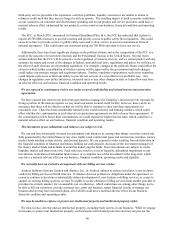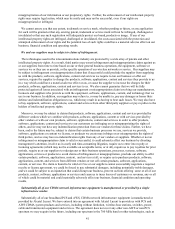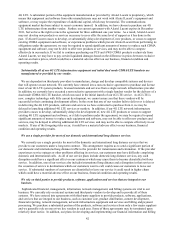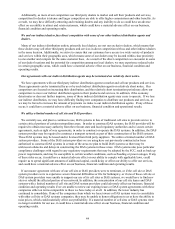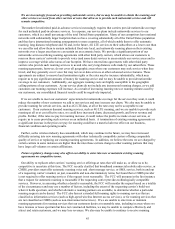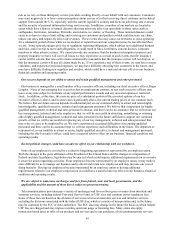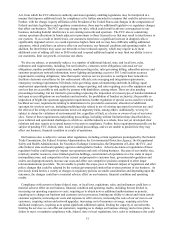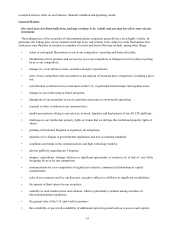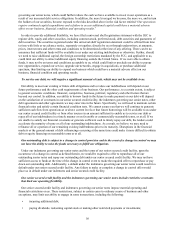Metro PCS 2010 Annual Report Download - page 59
Download and view the complete annual report
Please find page 59 of the 2010 Metro PCS annual report below. You can navigate through the pages in the report by either clicking on the pages listed below, or by using the keyword search tool below to find specific information within the annual report. 49
• vendor or supplier failures or delays;
• software defects;
• viruses, malware, worms, Trojan horses, unsolicited mass advertising, denial of service and other malicious
or abusive attacks by hackers;
• fraud, including customer credit card fraud, subscription or dealer fraud;
• unauthorized use of our or our provider’s networks;
• human error;
• disruptions beyond our control, including disruptions caused by criminal or terrorist activities, theft, natural
disasters, such as earthquakes, hurricanes, floods, or fire; and
• failures in operational support systems.
Our network security, processes and strategies are designed to protect and prevent unauthorized access to our
network and data on our network. The techniques and tools used to sabotage or gain unauthorized access to
networks changes frequently and we may not be able to anticipate or implement adequate prevention measures
timely. Network disruptions, whether from natural causes or manmade, may cause interruptions in service,
degradation of service, excessive call volumes to call centers, damage to our or our customer’s equipment or
reduced capacity for customers, all of which could cause us to lose customers and incur expenses. Some portions of
our network are not fully redundant and our disaster relief plans may not be adequate or timely. The resulting
interruption or failure to provide our services could have a material adverse effect on our business, financial
condition and operating results.
Further, our administrative and capital costs associated with detecting, monitoring and reducing the incidence of
fraud, or the costs to replace or repair the network or facilities (or portions thereof), may be substantial, thus causing
our costs to provide service to increase. Fraudulent use of our network may also impact interconnection and long
distance costs, capacity costs, roaming costs, administrative costs, fraud prevention costs and payments to other
carriers for such fraud. We believe we have instituted safeguards to protect, detect and control such fraud; however,
if such safeguards are not successful, such fraud or increased costs could have a material adverse impact on our
financial results and impair our service resulting in higher churn as our competitors systems may not experience
similar problems.
Additionally, our physical facilities and information systems may be vulnerable to physical break-ins, computer
viruses, theft, attacks by hackers, or similar disruptive problems. If hackers gain improper access to our databases,
they may be able to steal, publish, delete, misappropriate or modify confidential personal information concerning
our subscribers. Due to the evolving techniques used to obtain unauthorized access to our systems, we may not be
able to implement adequate preventive measures timely or prevent such unauthorized access. In addition, misuse of
our customer information could result in harm to our customers and legal actions against us and to additional harm
perpetrated by third parties who are given access to the consumer data. The actual or perceived failure to our
network security could damage our reputation and public perception of our ability to provide a secure service, which
could adversely affect our ability to retain customers, expose us to significant liability, sanctions, fines and litigation
and have a resulting material adverse effect on our business, financial condition and operating results.
Risks Related to Legal and Regulatory Matters
Our ability to provide service to our customers and generate revenues could be harmed by adverse regulatory
action.
Our FCC licenses are major assets that we use to provide our services. Our FCC licenses are subject to revocation
and we may be subject to fines, forfeitures, penalties or other sanctions, including the imposition of mandatory
reporting requirements, license conditions, corporate monitors, forfeiture of existing licenses, and limitations on our
ability to participate in future FCC auctions, if the FCC were to find that we are not in compliance with its rules or
the requirements of the Communications Act. Many of our licenses are subject to interim or final construction



